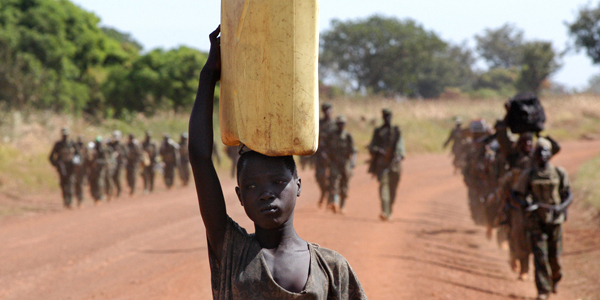UPDATES
Joseph Kony’s Sudanese connection
March 8, 2012 | Daniel Meyerowitz-Katz

Stop Kony 2012, a video by US-based NGO ‘Invisible Children’, has become a viral sensation overnight and has seemingly coopted thousands if not millions to the cause of hunting-down Ugandan warlord Joseph Kony. While the organisation behind the video is questionable, there is no doubt that Kony himself is deserving of the criticism that he is being given; his numerous war crimes, including kidnapping children and forcing them to serve him as child soldiers or sex slaves, have placed him at the top of the International Criminal Court’s wanted list.
While the world is now very aware of Kony’s crimes, what is less well known is how he came to hold such power in the first place. As the Atlantic‘s Max Fisher observed last year, Kony’s “Lord’s Resistance Army” (LRA) was initially little more than a band of poorly-equipped amateurs and would have been crushed by the Ugandan army if not for the support of another wanted war criminal, Sudanese President Omar al-Bashir.
… The Ugandan government had otherwise made or enforced relative peace and began to focus on the LRA. That might have been the beginning of the end for Kony, but Central Africa’s turbulent regional politics had just shifted in his favor. Uganda and Sudan were at a state of low-level, undeclared war: Uganda was supporting rebels groups in southern Sudan who fought that country’s Arab, north-based government. Sudan responded by adopting the LRA as its own, offering them safe havens in Sudan and truckloads of Kalashnikov rifles.
The Sudanese government asked Kony to spread chaos in Uganda as well as in southern Sudan. Some of the rural villages in both countries had never seen a rifle before, much less an advancing column of children, roped together and wildly firing automatic assault rifles. Many people on both sides died in every skirmish, but the hardy Kalashnikovs endured. Kony would stash them in caves and anthills, retrieving them months or years later. Disarming the LRA today would mean sweeping thousands of miles of dense jungle with metal detectors. Defunding them would require persuading Sudanese President Omar Bashir, who is still fighting insurgent groups in Darfur and elsewhere, that supporting terrorist groups, his signature tactic for decades, is no longer in his interest.
The Sudan-LRA alliance was one of convenience; it came about due to the hostilities between Uganda and the Sudanese regime in Khartoum and was part of an ensuing proxy war. Michael Wilkerson elaborated on this in a 2010 Foreign Policy article:
For much of the 1990s, the LRA took advantage of an ugly enemy-of-my-enemy game played between Sudan and Uganda. Kampala (and quietly the United States) funded the Sudan People’s Liberation Army (SPLA), a mostly black-African and Christian rebel group in South Sudan, in its struggle against the Arab-dominated Sudanese national government; Khartoum supported the LRA in retaliation. So in exchange for keeping Uganda off balance and occasionally fighting the SPLA, the LRA got weapons and protection from Sudan.
Officially, Sudanese support for the LRA ended in 1999, though it is believed to have continued sporadically afterward for several years. Then, in 2002, the Sudanese government appeared to sell out the LRA completely.
The agenda of the current campeign to “stop” Kony is rather dubious. In most ways, he has already been stopped — he was forced to flee Uganda several years ago and is currently being chased around the Congo as his forces are slowly wittled away by a coalition of Ugandan, South Sudanese and Congolese forces with American backing and training. Of course, it would be ideal if he could be brought to trial and punished, but at least his crimes against innocent people seem to be all but over.
That said, as this blog reported last month, Bashir is not only still very much at large, but he is being protected from his indictment by the African Union. Moreover, there are now new allegations that the Sudanese regime is committing atrocities against the people of the Nuba mountains. Perhaps the world would be better served by focussing their attention on Bashir, a war criminal who is not currently being subjected to a manhunt, leaving him free to continue killing.
Daniel Meyerowitz-Katz
Tags: Africa





